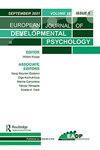The role of attachment styles in attention-deficit hyperactivity disorder: A meta-analytic review from the perspective of a transactional development model
IF 2.1
4区 心理学
Q3 PSYCHOLOGY, DEVELOPMENTAL
European Journal of Developmental Psychology
Pub Date : 2022-04-25
DOI:10.1080/17405629.2022.2069095
引用次数: 0
Abstract
ABSTRACT Attention-deficit hyperactivity disorder (ADHD) is a neurodevelopmental disorder characterized by pervasive alterations in self-regulation. Attachment patterns could be involved in maintaining the clinical features of ADHD during development. This meta-analytic review summarizes the findings of 26 cross-sectional and longitudinal studies that assessed correlations between attachment styles and ADHD features among children and adolescents. Results show that insecure attachment highlighted significant correlations with ADHD inattention and hyperactivity symptoms. Dismissive/avoidant attachment was associated with inattention features. Ambivalent/preoccupied attachment correlated with hyperactivity symptoms. Disorganized attachment was associated with inattentive symptoms. Insecure attachment was prospectively associated with later ADHD symptoms. Cross-sectional correlations between insecure attachment and ADHD symptoms were comparable to longitudinal ones. This might suggest a transactional developmental model of ADHD considering mutual reinforcement effects of insecure attachment patterns and core clinical features of the disorder. Clinical samples with ADHD should be assessed in order to support this theoretical framework.依恋类型在注意缺陷多动障碍中的作用:交易发展模型视角下的元分析
注意缺陷多动障碍(ADHD)是一种以自我调节普遍改变为特征的神经发育障碍。在发展过程中,依恋模式可能参与维持ADHD的临床特征。本荟萃分析综述了26项横断面和纵向研究的结果,这些研究评估了儿童和青少年依恋类型与ADHD特征之间的相关性。结果表明,不安全依恋与ADHD注意力不集中和多动症状有显著相关性。不屑一顾/回避依恋与注意力不集中特征相关。矛盾型/专注型依恋与多动症状相关。无组织依恋与注意力不集中症状相关。不安全依恋与后来的ADHD症状有可能相关。不安全依恋与ADHD症状之间的横断面相关性与纵向相关性相当。这可能表明ADHD的交易发展模型考虑了不安全依恋模式的相互强化效应和该疾病的核心临床特征。需要对ADHD的临床样本进行评估,以支持这一理论框架。
本文章由计算机程序翻译,如有差异,请以英文原文为准。
求助全文
约1分钟内获得全文
求助全文
来源期刊

European Journal of Developmental Psychology
PSYCHOLOGY, DEVELOPMENTAL-
CiteScore
3.70
自引率
0.00%
发文量
35
 求助内容:
求助内容: 应助结果提醒方式:
应助结果提醒方式:


